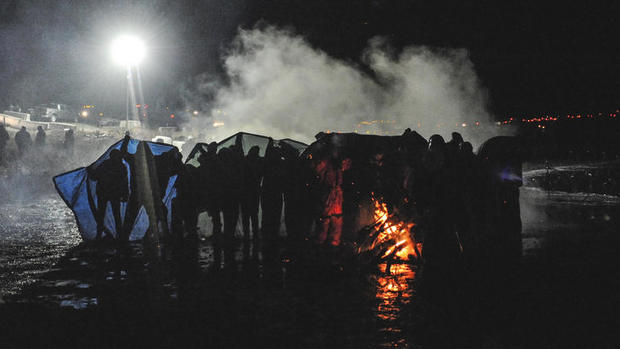Victims Shouldn’t Have to Pay for the Law Enforcement Costs Created by Their Abusers

Police use a water cannon to put out a fire started by protesters during a protest against plans to pass the Dakota Access pipeline near the Standing Rock Indian Reservation, near Cannon Ball, North Dakota, U.S. November 20, 2016. REUTERS/Stephanie Keith
Here’s a simple truth about the #NoDAPL protests against the Dakota Access Pipeline: The pipeline company was repeatedly the victim of violent crime and vandalism while working, lawfully, to complete a permitted project. The political extremists who organized and perpetrated the often unlawful, often violent demonstrations were the perpetrators.
That’s the point I make in my print column today, arguing that Energy Transfer Partners (the company behind Dakota Access) shouldn’t reimburse the state of North Dakota for law enforcement costs resulting from the protest response.
Kelcy Warren, the CEO of the company, made the offer to reimburse the state for at least some of the law enforcement expenses on my radio show (among other venues) last year. But he shouldn’t have made that offer. The precedent it would set would be awful. A pipeline company paying for the chaos and turmoil caused by violent activists would only serve to encourage said activists.
Plus, it’s not clear the offer is still on the table. Warren’s company has sold their ownership interest in DAPL now that the project is completed.
North Dakota taxpayers are on the hook for roughly $38 million in costs from the protest. In a perfect world those costs would be tied to the protesters who created them with their intransigence and unlawful activities. I suppose the state could file suit against some of the groups who organized the protests, but that litigation would create costs of its own with little guarantee of victory. Or actual payment, for that matter.
State officials have applied to receive $13.8 million from a Justice Department program for emergency law enforcement costs. That’s a good start, and Governor Doug Burgum has told me that it’s his goal to have the taxpayers pay “zero dollars” of this cost.
I’m not sure that’s an achievable goal. I suspect the taxpayers will end up paying most of this bill.
That’s still preferable to the pipeline company picking up the tab.




